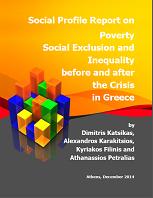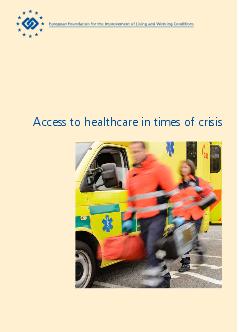Several developments in recent weeks have led to a change of circumstances and thereby the strategy of both sides is bound to change as well. On the one hand, they are trying to avoid a possible crisis of the Eurozone edifice as a result of a new Greek bankruptcy and a possible Grexit. On the other hand, they wish to avoid the strengthening of extremist parties in the EU and …Read More
This section contains original papers written exclusively for the Crisis Observatory. The Observatory hosted three different publication series: opinion articles, policy papers, and research papers. Access to the Crisis Observatory papers is free.
Thomas Papadopoulos: Privatized companies, golden shares and property ownership in the Euro crisis era: A discussion after Commission v. Greece
In Commission v. Greece, the Court of Justice of the European Union examined Article 345 TFEU (ex Article 295 EC) on property ownership, in the context of golden shares of privatized companies. The neutrality of the EU towards privatizations is questioned. The scope and the outer limits of Article 345 TFEU are also scrutinized and a few distinctions are drawn. The decision whether to privatize and to introduce golden shares …Read More
Dimitris Psarrakis: How much tax harmonization is enough? The quest for an efficient EU tax regime
The financial crisis revealed the need for a sound fiscal policy in the EU. Taxation is a critical component for fiscal deepening in the common market. The LuxLeacks cases made clear that it is impossible for the common market to function without distortions unless a more coherent rule-based approach is in place. According to the European Scoreboard of Macroeconomic Imbalances, the EU corporate investments attractiveness in the post-crisis period was …Read More
Yiannis Kitromilides and Thanos Skouras: “Greece and the Eurozone Crisis: Two Narratives”
The ‘Greek story’ is in accord with and conveniently lends support to the widely-held view, especially in northern Europe, according to which the euro crisis is due to fiscal imprudence and excessive sovereign debt. The alternative and correct narrative recognizes the financial origin and the market malfunctioning, specifically in banking and construction, that caused the crisis. Moreover, it attributes the crisis to the Eurozone’s flawed architecture, which lacks the appropriate …Read More
Dimitri A. Sotiropoulos: The Double Mismatch – Anti-Poverty Policies & Discourses on Poverty & Social Exclusion in Greece under the Economic Crisis
Based on recent statistics on the social impact of the financial crisis, on an overview of social policy measures to tackle poverty and social exclusion in Greece during the crisis, as well as on interviews with politicians, reporters, trade unionists, technocrats and NGO members that took place in 2014, this paper brings out a problem of double inconsistency or mismatch. The first inconsistency lies in the extent and complexity of …Read More
Social Profile Report on Poverty, Social Exclusion and Inequality Before and After the Crisis in Greece
Katsikas, D., Karakitsios, Α., Filinis, Κ. & Petralias, Α.: “Social Profile Report on Poverty, Social Exclusion and Inequality Before and After the Crisis in Greece“, Crisis Observatory, Athens: December 2014. This report is the result of research conducted in the context of the research programme “Fragmentation and Exclusion: Understanding and Overcoming the Multiple Impacts of the European Crisis” (FRAGMEX). FRAGMEX takes place under the auspices of a bilateral programme …Read More
Manolis Galenianos: The Greek Crisis – Origins and Implications
The conventional wisdom is that the Greek and Eurozone crises are the result of fiscal profligacy, which has justified austerity as the primary policy to exit the crisis. This interpretation of the crisis fits the case of Greece and, to a lesser extent, Portugal, but cannot explain why Ireland and Spain had to request assistance, given that prior to 2008 they had lower deficits and public debt than most Eurozone …Read More
Ioannis Nasioulas: Social Economy: A Viable Alternative?
Social investments could be an antidote to the crisis. By organizing a context of public, private and direct foreign investments, which would bind them to measurable externalities of enhancing quality employment and reconstituting social cohesion, Greece can step into an environment of sustainable social development and rise of family incomes. In the sector of social economy, there exist investment opportunities which can produce social value added. In this paper, we …Read More
Access to healthcare in times of crisis
Eurofound (2014) Access to healthcare in times of crisis, Eurofound Surveys: EF14421, 31 October. Research Project by Eurofound, where the Crisis Observatory also participated by examining Greece as a case study. The aim of the research programme was to record the impact of the crisis on citizens’ access to health services as well as to highlight best practices and initiatives that can be applied in the administration of health services’ …Read More
Stratos D. Kamenis: Vulture Funds and the Sovereign Debt Market: Lessons from Argentina and Greece
Vulture funds and rogue creditors put in question the sustainability of the sovereign debt market by creating confusion and uncertainty in the global financial system. On the one hand, they take advantage of indebted countries’ economic hardship to profit at the expense of bondholders who participate in debt restructurings. On the other hand, vulture funds’ predatory behavior and litigation tactics keep the market alive by discouraging moral hazard and forcing …Read More







